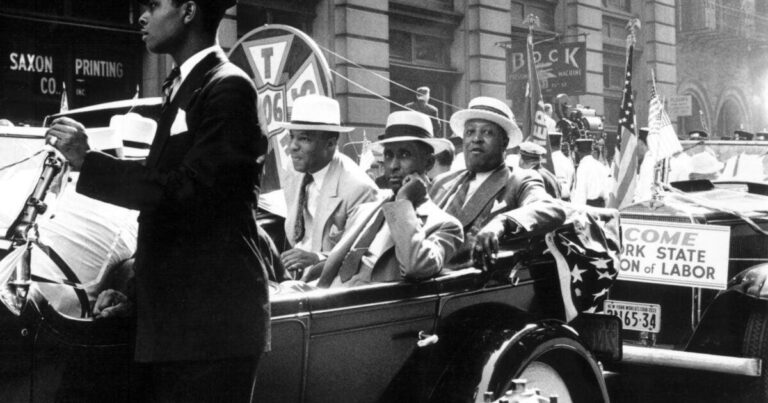Influential Black Leaders Who Shaped the American Labor Movement
Championing Workers’ Rights: The Impact of Black Leadership in U.S. Labor History
The American labor movement owes much of its progress to the relentless efforts of Black leaders whose vision and activism transformed the fight for workers’ rights. As emphasized by the National Education Association (NEA), these pioneers not only confronted racial discrimination within labor unions but also advocated for fair wages, safer workplaces, and equal treatment for all employees. Their work underscored the inseparable link between racial justice and economic equity, laying the groundwork for a more inclusive labor landscape.
Beyond labor reforms, these leaders prioritized education, community empowerment, and political participation, broadening their influence well beyond the factory floor.Their enduring legacy continues to inspire labor advocates and social justice movements across the nation.Below is a summary of five key figures whose leadership left an indelible mark:
- A. Philip Randolph: Pioneered inclusion of Black workers in major unions and federal employment programs.
- Ella Baker: Connected grassroots labor activism with the broader civil rights movement.
- Bayard Rustin: Mastermind of nonviolent protest strategies linking labor and civil rights causes.
- Fannie Lou Hamer: Advocated for voting rights and labor protections for farmworkers.
- Dorothy Height: Advanced women’s leadership roles within labor and education sectors.
| Leader | Major Contributions | Active Period |
|---|---|---|
| A. Philip Randolph | Organized the Brotherhood of Sleeping Car Porters; led the 1963 March on Washington | 1930s‚Äď1960s |
| Ella Baker | Grassroots organizing; co-founder of the Student Nonviolent Coordinating Committee (SNCC) | 1950s‚Äď1960s |
| Bayard Rustin | Strategized nonviolent protests; bridged labor and civil rights movements | 1940s‚Äď1960s |
| Fannie Lou Hamer | Fought for agricultural labor rights and voting access | 1960s |
| Dorothy Height | Promoted women‚Äôs leadership in labor and education | 1950s‚Äď2000s |
Transforming Labor Unions and Advancing Educational Equity
These visionary leaders not only secured improved wages and safer working environments but also dismantled racial barriers within predominantly white labor unions. Their advocacy extended to fostering inclusivity in union membership and leadership,ensuring that Black workers had a voice and representation. By intertwining racial justice with labor rights,they forged alliances that amplified the labor movement’s reach and effectiveness nationwide.
In the realm of education, their influence sparked important reforms aimed at providing equitable opportunities for Black students and educators. Through persistent organizing and policy advocacy, they championed fair funding, culturally relevant curricula, and professional advancement for Black teachers. Their pioneering work laid the foundation for ongoing efforts toward educational justice, which remain critical today as disparities persist.
| Leader | Notable Contribution | Focus Area |
|---|---|---|
| A. Philip Randolph | Led the March on Washington | Labor & Civil Rights |
| Ella Baker | Developed grassroots leadership | Union Inclusion |
| Bayard Rustin | Built strategic coalitions | Labor & Civil Rights |
| Fannie Lou Hamer | Advocated for voting and labor rights | Political & Labor Equity |
| Septima Clark | Established adult education workshops | Educational Equity |
- Breaking racial ceilings: Opened pathways for Black workers to ascend union leadership.
- Educational advocacy: Championed equal access and enriched learning experiences.
- Coalition building: United diverse communities to drive systemic change.
- Policy reform: Challenged segregationist practices in schools and workplaces.
Insights from Past Leaders for Contemporary Labor Advocates
Reflecting on the achievements and challenges faced by Black labor pioneers offers essential lessons for today‚Äôs activists. Their success was rooted in solidarity, strategic planning, and steadfast determination. By fostering unity across racial and economic divides, they amplified the collective power of workers. Their multifaceted tactics‚ÄĒfrom mass demonstrations to legislative lobbying‚ÄĒdemonstrate the necessity of adaptability and innovation in addressing evolving labor issues.
Current labor advocates can draw from these enduring principles:
- Emphasize education: Equip workers with knowledge about their rights and labor history.
- Forge alliances: Bridge social and economic gaps to build stronger movements.
- Engage in policymaking: Influence laws to secure lasting worker protections.
- Maintain resilience: Persist in the face of opposition and setbacks.
These strategies empower today’s labor leaders to confront contemporary challenges while envisioning a future grounded in fairness and justice.
Empowering Emerging Black Labor Leaders for Tomorrow
To cultivate the next generation of Black labor leaders, investment in mentorship and education is paramount. Initiatives that connect young activists with experienced union veterans foster a continuum of knowledge and skills, blending conventional organizing methods with modern labor challenges. Emphasizing cultural awareness and navigating systemic inequities equips these leaders to advocate effectively for workplace equity and inclusion.
Incorporating technology and data analytics into leadership development is equally vital. Digital tools enable organizers to mobilize communities efficiently, monitor labor violations, and influence policy with data-driven precision. By merging grassroots passion with technological innovation,emerging Black labor leaders will be well-prepared to spearhead impactful campaigns that resonate across industries and generations.
Looking Ahead: Continuing the Legacy of Black Labor Leadership
The enduring legacies of these five Black leaders serve as powerful reminders of how courage, vision, and advocacy can transform workers’ rights. Their groundbreaking contributions not only reshaped the labor movement but also advanced equity and inclusion within unions and society at large.As the National Education Association and other organizations persist in championing social and economic justice, honoring these trailblazers’ achievements remains essential. Their stories provide both a historical foundation and a source of inspiration for future generations committed to creating fair and just workplaces.




